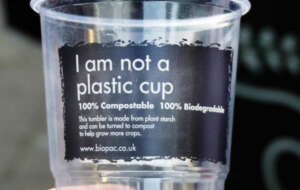Embracing Compostable Plastic for a Sustainable Tomorrow-IML products as example
Over the past few years, sustainability has become increasingly important across a range of industries, with the plastics sector being no exception.
Amid mounting worries about environmental harm, compostable plastics have emerged as a viable substitute for conventional petroleum-derived plastics.
This piece explores the intricacies of compostable plastics, including their advantages, obstacles, uses, and their pivotal role in fostering a more environmentally friendly tomorrow.

A. Understanding Compostable Plastics
Compostable plastics, also referred to as biodegradable plastics, represent a category of materials capable of undergoing biological decomposition within a composting setting. Unlike their conventional counterparts, which endure in the environment for extended periods, compostable plastics break down into natural components like carbon dioxide, water, and biomass under specific conditions.

The fundamental disparity between compostable plastics and standard plastics lies in their composition. Compostable plastics are typically crafted from renewable sources like corn starch, sugarcane, or cellulose, rendering them more ecologically sound. Engineered to emulate the functionality of traditional plastics, they present a sustainable resolution for end-of-life disposal concerns.
B. Benefits of Compostable Plastics
Minimized Environmental Footprint: Compostable plastics offer a means to diminish dependence on fossil fuels and alleviate the pollution linked with conventional plastics. By breaking down into non-toxic elements, they aid in fostering healthier soil and water ecosystems.
Waste Minimization: Compostable plastics facilitate composting and waste diversion initiatives, aiding in the reduction of landfill waste and the advancement of a circular economy model. Their compatibility with existing composting infrastructure minimizes disposal complexities, promoting efficient waste management practices.
Resource Preservation: Compostable plastics, derived from renewable sources, bolster sustainable agriculture and curb the depletion of non-renewable resources. This aligns with global endeavors to enhance resource efficiency and conservation.
Consumer Demand: Rising environmental consciousness among consumers has spurred a preference for products and packaging fashioned from compostable materials. Brands embracing compostable plastics often appeal to environmentally aware consumers, thereby bolstering their brand reputation.
C. Challenges and Considerations
Despite the environmental advantages they offer, compostable plastics present several challenges and considerations that require attention:
Certification and Standards: Ensuring that compostable plastics adhere to recognized compostability standards is essential to prevent greenwashing and ensure proper degradation in composting facilities.
Infrastructure: The availability of composting facilities and infrastructure varies regionally. Expanding composting infrastructure and educating consumers about the correct disposal of compostable plastics are crucial for maximizing their environmental benefits.
Performance and Durability: Compostable plastics must demonstrate performance and durability comparable to traditional plastics in various applications, such as packaging and food service, to gain widespread acceptance.
Cost Considerations: While the prices of compostable plastics are decreasing with advancing technology, their initial cost may still be higher than that of traditional plastics, which could hinder widespread adoption in some industries.
Consumer Education: Educating consumers about the proper disposal and composting of compostable plastics is necessary to prevent contamination of recycling streams and landfills.
D. Applications of Compostable Plastics
Compostable plastics find diverse applications across various industries:
Packaging: Compostable packaging materials, including bags, containers, and films, are increasingly utilized in food packaging, retail products, and shipping to reduce environmental impact.
Food Service: Compostable cutlery, plates, cups, and straws serve as popular alternatives in the food service industry, aiding in the reduction of plastic waste in restaurants and events.
Agriculture: Compostable mulch films and agricultural products support sustainable farming practices, diminishing plastic contamination in soil and water.
Medical and Healthcare: Transitioning to compostable alternatives for certain medical devices and packaging materials ensures both safety and environmental responsibility in the healthcare sector.
Consumer Goods: Compostable materials are integrated into the production of disposable items such as diapers, wipes, and hygiene products, providing consumers with eco-friendly choices.
E. Future Trends and Innovations
Looking forward, several trends and innovations are shaping the future of compostable plastics:
Advanced Materials: Ongoing research and development efforts are resulting in the creation of compostable plastics with enhanced durability, performance, and versatility, broadening their utility across various industries.
Biopolymer Blends: The combination of different biodegradable polymers and additives is enhancing the properties and compostability of plastics, offering tailored solutions for specific applications.
Smart Packaging: Integration of smart technologies, such as biodegradable sensors and indicators, into compostable packaging is improving functionality while ensuring environmental compatibility.
Circular Economy Models: Collaborative initiatives to establish closed-loop systems for compostable plastics, spanning from production to disposal and composting, are gaining momentum, promoting a more sustainable and efficient waste management approach.
Policy and Regulation: Continued governmental support and incentives for compostable plastics, coupled with stricter measures against single-use plastics, are propelling market growth and fostering innovation in sustainable packaging solutions.
Conclusion
Compostable plastics mark a substantial leap forward in tackling the environmental hurdles posed by conventional plastics. Their biodegradable nature, resource efficiency, and capacity to facilitate closed-loop systems in circular economies render them a valuable asset in environmental conservation efforts and the promotion of sustainable practices across sectors. With ongoing technological advancements, heightened consumer awareness, and evolving regulatory frameworks, the future appears promising for compostable plastics as a pivotal force in environmental stewardship and the promotion of responsible waste management.
MARKROBOTIC LTD COMPANY Has more than 14 years of experience and is well known for high-performance IML ROBOT ,EOAT System , TOP ENTRY ROBOT , Handle Fitting Machines, cobot robot , Medical Automation Systems as well as innovative downstream solutions that include Product/Decoration Inspection, Assembly-and Box Filling Systems.
Headquarter of MARKROBOTIC is based in Istanbul /Turkey , providing superior service and greater overall value to a rapidly expanding global customer base.




